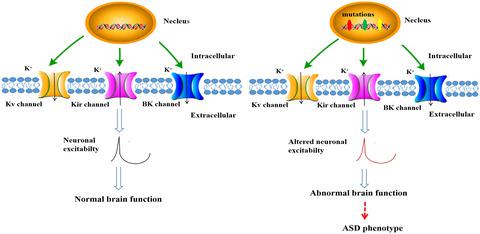当前位置:
X-MOL 学术
›
Int. J. Dev. Neurosci.
›
论文详情
Our official English website, www.x-mol.net, welcomes your
feedback! (Note: you will need to create a separate account there.)
Potassium channels and autism spectrum disorder: An overview
International Journal of Developmental Neuroscience ( IF 1.7 ) Pub Date : 2021-05-18 , DOI: 10.1002/jdn.10123 Peipei Cheng 1 , Zilong Qiu 2, 3 , Yasong Du 1
International Journal of Developmental Neuroscience ( IF 1.7 ) Pub Date : 2021-05-18 , DOI: 10.1002/jdn.10123 Peipei Cheng 1 , Zilong Qiu 2, 3 , Yasong Du 1
Affiliation

|
Autism spectrum disorder (ASD) comprises a group of neurodevelopmental disorders characterized by impaired social interaction and communication, and restricted, repetitive patterns of behaviors, interests, or activities. It had been demonstrated that potassium channels played a key role in regulating neuronal excitability, which was closely associated with neurological diseases including epilepsy, ataxia, myoclonus, and psychiatric disorders. In recent years, a growing body of evidence from whole-genome sequencing and whole-exome sequencing had identified several ASD susceptibility genes of potassium channels in ASD subjects. Genetically dysfunction of potassium channels may be involved in altered neuronal excitability and abnormal brain function in the pathogenesis of ASD. This review summarizes current findings on the features of ASD-risk genes (KCND2, KCNQ2, KCNQ3, KCNH5, KCNJ2, KCNJ10, and KCNMA1) and further expatiate their potential role in the pathogenicity of ASD.
中文翻译:

钾离子通道和自闭症谱系障碍:概述
自闭症谱系障碍 (ASD) 包括一组神经发育障碍,其特征是社交互动和沟通受损,以及行为、兴趣或活动的受限、重复模式。已经证明钾通道在调节神经元兴奋性中起关键作用,这与包括癫痫、共济失调、肌阵挛和精神疾病在内的神经系统疾病密切相关。近年来,越来越多来自全基因组测序和全外显子组测序的证据已经确定了 ASD 受试者钾通道的几个 ASD 易感基因。钾通道的遗传功能障碍可能与 ASD 发病机制中的神经元兴奋性改变和脑功能异常有关。这篇综述总结了目前关于 ASD 风险基因特征的发现(KCND2、KCNQ2、KCNQ3、KCNH5、KCNJ2、KCNJ10和KCNMA1)并进一步阐述了它们在 ASD 致病性中的潜在作用。
更新日期:2021-05-18
中文翻译:

钾离子通道和自闭症谱系障碍:概述
自闭症谱系障碍 (ASD) 包括一组神经发育障碍,其特征是社交互动和沟通受损,以及行为、兴趣或活动的受限、重复模式。已经证明钾通道在调节神经元兴奋性中起关键作用,这与包括癫痫、共济失调、肌阵挛和精神疾病在内的神经系统疾病密切相关。近年来,越来越多来自全基因组测序和全外显子组测序的证据已经确定了 ASD 受试者钾通道的几个 ASD 易感基因。钾通道的遗传功能障碍可能与 ASD 发病机制中的神经元兴奋性改变和脑功能异常有关。这篇综述总结了目前关于 ASD 风险基因特征的发现(KCND2、KCNQ2、KCNQ3、KCNH5、KCNJ2、KCNJ10和KCNMA1)并进一步阐述了它们在 ASD 致病性中的潜在作用。









































 京公网安备 11010802027423号
京公网安备 11010802027423号